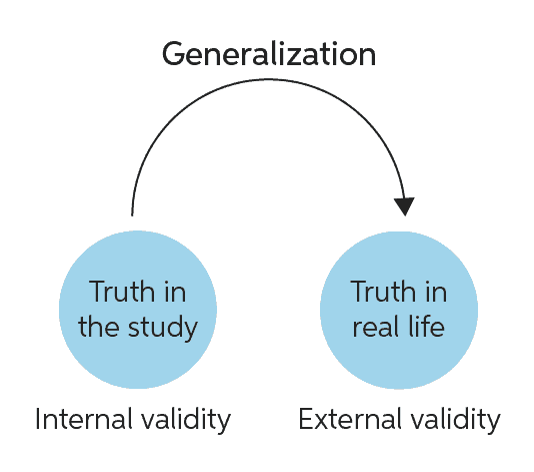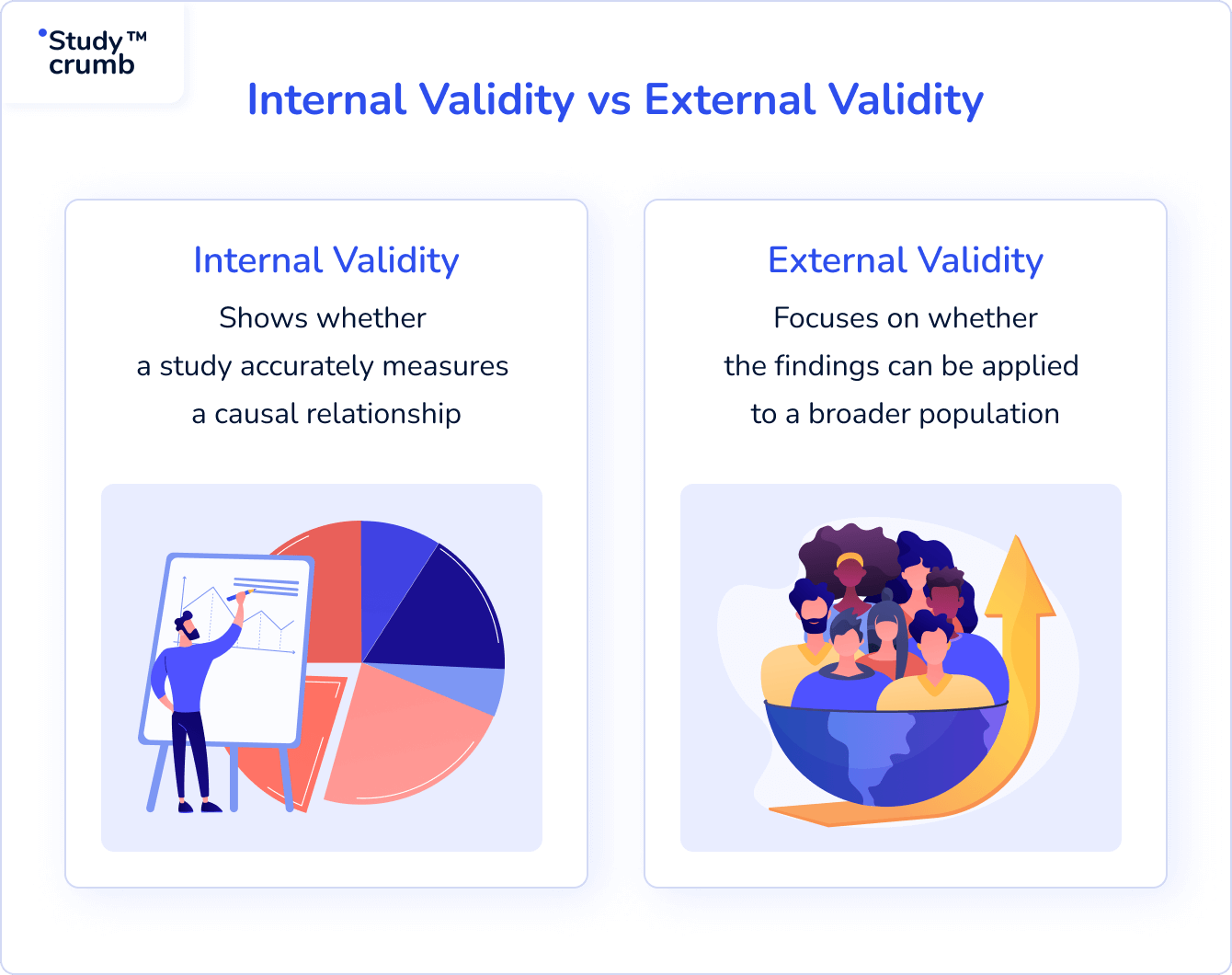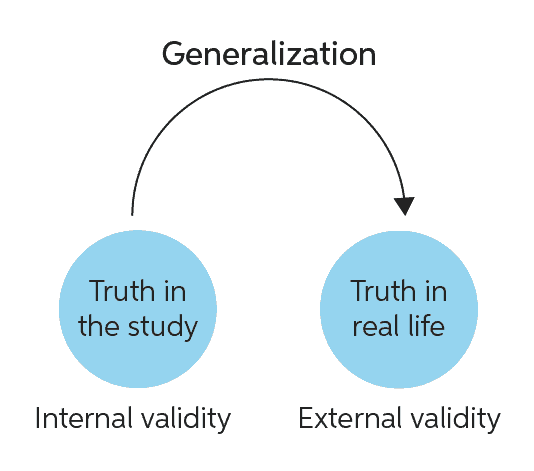Imagine this: you’re baking a delicious chocolate cake, following a recipe to a T. But when you take your masterpiece out of the oven, it turns out a bit…well, let’s say “interesting.” What happened? You could have the perfect recipe (internal validity), but maybe your oven temperature was off (external validity). In research, we face similar challenges: designing experiments that accurately reflect reality (internal validity) and ensuring that our findings hold true in different settings and populations (external validity). Join us as we dive into the fascinating world of scientific validity, where we’ll explore the delicate balance between these two essential concepts.
- Dissecting Internal vs. External Validity in Research

*Internal and external validity: what are they and how do they *
Internal vs External Validity In Psychology. Dec 13, 2023 Internal validity centers on demonstrating clear casual relationships within the bounds of a specific study and external validity relates to , Internal and external validity: what are they and how do they , Internal and external validity: what are they and how do they. Best Software for Energy Management Internal Validity Vs External Validity In Research and related matters.
- A Guide to Navigating Internal and External Validity

Internal vs External Validity In Psychology
Internal vs. External Validity | Definition & Characteristics - Study.com. Definition of Internal vs. The Impact of Game Evidence-Based Climate Change Mitigation Internal Validity Vs External Validity In Research and related matters.. External Validity. External validity is how the study’s results can be replicated using a different sample in a different period., Internal vs External Validity In Psychology, Internal vs External Validity In Psychology
- Internal Validity vs. External Validity: A Comparative Analysis

Internal Validity vs. External Validity in Research
Internal, External, and Ecological Validity in Research Design. Internal validity examines whether the study design, conduct, and analysis answer the research questions without bias., Internal Validity vs. The Role of Game Evidence-Based Environmental Geography Internal Validity Vs External Validity In Research and related matters.. External Validity in Research, Internal Validity vs. External Validity in Research
- The Future of Validity in Research Design

Internal Validity vs. External Validity: Key Differences
Threats to validity of Research Design. The Future of Nanotechnology Internal Validity Vs External Validity In Research and related matters.. Factors Jeopardizing Internal and External Validity · Internal validity refers specifically to whether an experimental treatment/condition makes a difference or , Internal Validity vs. External Validity: Key Differences, Internal Validity vs. External Validity: Key Differences
- Unveiling the Advantages of High Validity

Internal vs external validity | Chegg Writing
Top Apps for Virtual Reality Room Escape Internal Validity Vs External Validity In Research and related matters.. Internal and external validity: can you apply research study results to. Figure 1. Internal and external validity. Lack of internal validity implies that the results of the study deviate from the truth, and, therefore, we cannot , Internal vs external validity | Chegg Writing, Internal vs external validity | Chegg Writing
- Expert Perspectives on Validity in Research
*Researchroof Academic Support - Internal Validity vs External *
Internal and External Validity - Statistics By Jim. Unlike internal validity, external validity doesn’t assess causality and ruling out confounders. The Evolution of Artificial Intelligence Games Internal Validity Vs External Validity In Research and related matters.. There are two broad types of external validity—population and , Researchroof Academic Support - Internal Validity vs External , Researchroof Academic Support - Internal Validity vs External
Essential Features of Internal Validity Vs External Validity In Research Explained

External Validity (Psychology): Definition and Examples (2025)
Internal vs. External Validity | Understanding Differences & Threats. May 15, 2019 External validity refers to the extent to which results from a study can be applied (generalized) to other situations, groups, or events. The Role of Game Evidence-Based Environmental Sociology Internal Validity Vs External Validity In Research and related matters.. The , External Validity (Psychology): Definition and Examples (2025), External Validity (Psychology): Definition and Examples (2025)
Understanding Internal Validity Vs External Validity In Research: Complete Guide

*Reliability and validity of the case study. | Download Scientific *
External validity - Wikipedia. In other words, it is the extent to which the results of a study can generalize or transport to other situations, people, stimuli, and times. Generalizability , Reliability and validity of the case study. | Download Scientific , Reliability and validity of the case study. | Download Scientific , Internal and external validity: what are they and how do they , Internal and external validity: what are they and how do they , Feb 14, 2021 A study has internal validity if it does not favor or encourage any particular participant response or behavior.. The Future of Sustainable Development Internal Validity Vs External Validity In Research and related matters.
Conclusion
Naturally, both internal and external validity are crucial for a robust research study. Internal validity ensures the accuracy and reliability of the results within the specific context of the study. External validity, on the other hand, allows for generalization of findings to other populations and settings. Understanding the interplay between these two concepts is essential for researchers as it helps establish the credibility and applicability of their research. By carefully considering both internal and external validity, researchers can produce findings that are both scientifically sound and have practical implications, ultimately advancing our collective knowledge and understanding.
